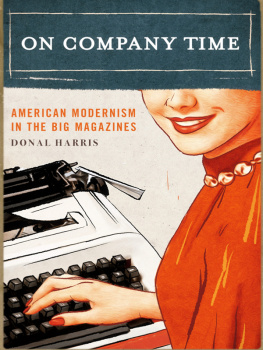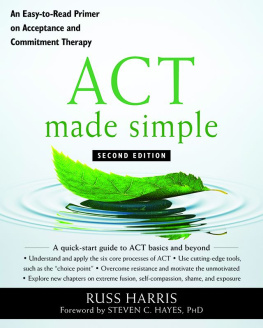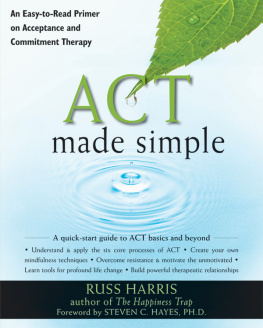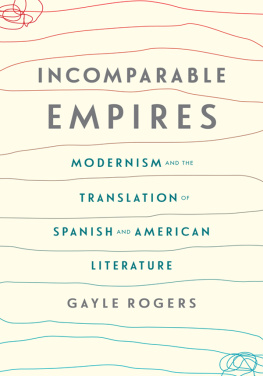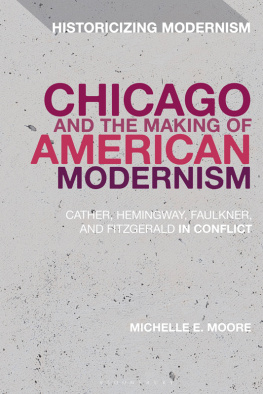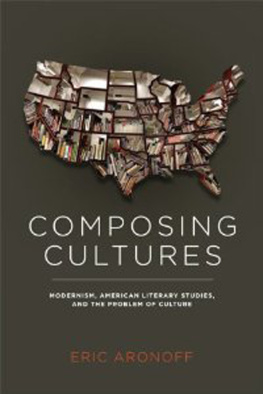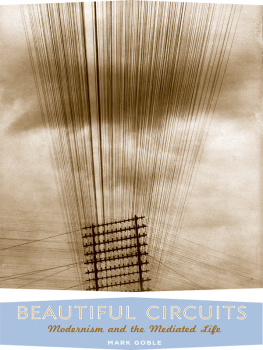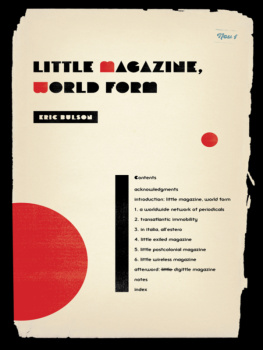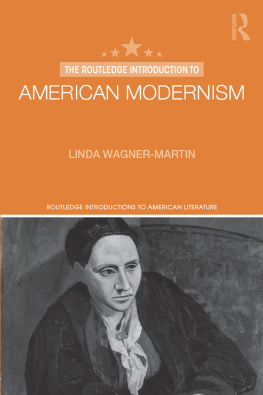Table of Contents
ON COMPANY TIME
Modernist Latitudes
MODERNIST LATITUDES
Jessica Berman and Paul Saint-Amour, Editors
Modernist Latitudes aims to capture the energy and ferment of modernist studies by continuing to open up the range of forms, locations, temporalities, and theoretical approaches encompassed by the field. The series celebrates the growing latitude (scope for freedom of action or thought) that this broadening affords scholars of modernism, whether they are investigating little-known works or revisiting canonical ones. Modernist Latitudes will pay particular attention to the texts and contexts of those latitudes (Africa, Latin America, Australia, Asia, Southern Europe, and even the rural United States) that have long been misrecognized as ancillary to the canonical modernisms of the global North.
Barry McCrea, In the Company of Strangers: Family and Narrative in Dickens, Conan Doyle, Joyce, and Proust, 2011
Jessica Berman, Modernist Commitments: Ethics, Politics, and Transnational Modernism, 2011
Jennifer Scappettone, Killing the Moonlight: Modernism in Venice, 2014
Nico Israel, Spirals: The Whirled Image in Twentieth-Century Literature and Art, 2015
Carrie Noland, Voices of Negritude in Modernist Print: Aesthetic Subjectivity, Diaspora, and the Lyric Regime, 2015
Susan Stanford Friedman, Planetary Modernisms: Provocations on Modernity Across Time, 2015
Steven S. Lee, The Ethnic Avant-Garde: Minority Cultures and World Revolution, 2015
Thomas S. Davis, The Extinct Scene: Late Modernism and Everyday Life, 2016
Carrie J. Preston, Learning to Kneel: Noh, Modernism, and Journeys in Teaching, 2016
Gayle Rogers, Incomparable Empires: Modernism and the Translation of Spanish and American Literature, 2016
On Company Time
AMERICAN MODERNISM IN THE BIG MAGAZINES
Donal Harris
COLUMBIA UNIVERSITY PRESS NEW YORK
COLUMBIA UNIVERSITY PRESS
Publishers Since 1893
NEW YORK CHICHESTER, WEST SUSSEX
cup.columbia.edu
Copyright 2016 Columbia University Press
All rights reserved
EISBN 978-0-231-54134-3
Library of Congress Cataloging-in-Publication Data
Names: Harris, Donal, author.
Title: On company time : American modernism in the big magazines / Donal Harris.
Description: New York : Columbia University Press, [2016] | Series: Modernist latitudes | Includes bibliographical references and index.
Identifiers: LCCN 2016013380 (print) | LCCN 2016024427 (ebook) | ISBN 9780231177726 (cloth : alk. paper) | ISBN 9780231541343 (e-book)
Subjects: LCSH: American literature20th centuryHistory and criticism. | Modernism (Literature)United States. | PeriodicalsPublishingUnited States History20th century. | Authors and publishersUnited StatesHistory 20th century. | Popular literatureUnited StatesHistory and criticism. | Literature and societyUnited StatesHistory20th century
Classification: LCC PS228.M63 H37 2016 (print) | LCC PS228.M63 (ebook) | DDC 810.9/112dc23
LC record available at https://lccn.loc.gov/2016013380
Set CIP data with hanging indent
A Columbia University Press E-book.
CUP would be pleased to hear about your reading experience with this e-book at .
Cover design: Philip Pascuzzo
CONTENTS
I N THE DAILY HUSTLE OF OFFICE LIFE, ITS EASY TO take for granted how edifying it can be to lean on ones colleagues and coworkers. This book makes a case for the central role such moments of institutional affiliation play in the history of American modernism, so it seems only fitting to begin by acknowledging my own debts. Foremost on this list is the University of Memphis, which has provided the supportfinancial, intellectual, temporal, moralto complete the research and writing of this book. Eric Link and Josh Phillips have been ideal department chairs, full of advice and encouragement that made life much easier. Conversations with Kathy Lou Schultz, Carey Mickalites, Shelby Crosby, Terrence Tucker, and Theron Britt have all made their way into this book, and Will Duffy, Darryl Domingo, and Ron Fuentes have made Memphis a wonderful place to live and work. Philip Leventhal and Columbia University Press have shown me invaluable support, and Ive been lucky to have them on my side in bringing this project to fruition.
Much of the research and writing of this book began in the basement of the English Department at the University of California, Los Angeles, where I was provided ample time and generous resources. Mark McGurl and Michael North have guided this project at every stage, have been unfailing in their support, and have struck models for rigorous, generous, and stylish scholarship that will stay with me long after this book is put to bed. Richard Yarborough taught me to say what I mean, and he made the things I say far more interesting. He also instilled in me a healthy fear of scare quotes, for which I will be forever grateful. Yogita Goyal made crucial suggestions to several chapters at a key moment of the revision process. At an early moment, Michael Szalay reminded me to write about what I likeadvice that went along way. Aaron Jaffe, Stuart Burrows, Loren Glass, Jeff Allred, Matthew Levay, Evan Kindley, and Merve Emre are only some of the far-flung readers who have left a mark on this project over the years.
Portions of two of these chapters benefited from the perennially insightful feedback of the Americanist Research Colloquium and the M/ELT research group at UCLA. Chris Looby, Michael Cohen, Sarah Mesle, Christopher Mott, and Brian Kim Stefans always asked the right questions. Jackie Ardam, Jeremy Schmidt, Jack Caughey, Christian Reed, Tara Fickle, and Justine Pizzo were inspiring fellow travelers in grad life. I always write with the goal of impressing Brendan OKelly and Ian Newman. Kate Marshall modeled for me good scholarship and good citizenship, and Im honored to call her a friend. Sam See was and is incomparable. The world is a less inspiring place without him.
Finally, I owe my deepest debts to my family. My parents, my brothers, and the Winn family have been unflagging in their faith in me. I cannot imagine where Id be without Sarahbeth Winn, who is the best person I know. This book is dedicated to SB, Milo, and Theodore.
Portions of is reprinted here with the permission of Duke University Press.
F RESH ON THE HEELS OF COMPILING FLAPPERS AND PHILOSOPHERS (1920), a short-story collection mostly culled from fiction previously published in the Saturday Evening Post, F. Scott Fitzgerald momentarily paused to imagine how popular magazines might occupy themselves when no one is reading them. The resulting short play, This Is a Magazine, published in

